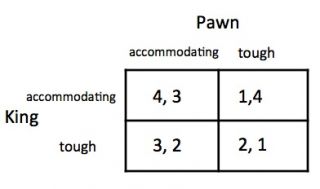
Being powerful is like being a lady. If you have to tell people you are, you aren’t. ~ Margaret Thatcher
When psychologists write about interpersonal power, they usually assume a strict separation between the powerful and the powerless. They define power as control over another person’s resources or outcomes. I have power over you if I can decide to give or withhold things that matter to you (e.g., money, vacation time, medicine, sex). This notion of power is uni-directional; it is not interactive and it does not require strategic thought or behavior. The question is simply whether I exert my power over you and how that makes me and you think, feel, and act. This is not the study of interdependence, but dependence.
Once we look at a sample of human relations, it is hard to find pure, one-sided dependence. Even prisoners find ways to manipulate guards. In real life, both parties have some power, although one may have a stronger hand. If you are a parent, ask yourself how often you fail to get your kid to do what you ask (clean her room). If you offer an incentive for compliance, the kid can act as if she doesn’t care, in which case you can try to call her bluff. "You can’t have the sleep-over." She, of course, can reinforce her bluff with a studied expression of indifference. For parent and kid, power is not a one-way street from demand to obedience, but a strategic game to see who will blink first. If you threaten your kid with consequences ("If you don’t get into the car right now, I will start driving."), she might call you bluff, knowing that it is unlikely that you will actually take off, leaving her behind at the mall. The parent is still more powerful than the kid in the sense that the parent has access to a greater range of incentives and sanctions, but her problem is that she would rather not escalate their use, and she wants to avoid being caught bluffing (for more on power games, veto games, and partner games).
The parent-kid game illustrates a general power dynamic. Leader and followers, bosses and workers, teachers and students, priests and parishioners play much the same game. Looking at Robinson Crusoe and his man Friday, I suggested that this power game is essentially unstable, but that reasonable people can settle into a routine in which the more powerful party withholds force and the less powerful party agrees not to rebel. This combination of strategies maximizes their overall well-being, while granting the more powerful party a small individual advantage.

Let us now look at the power game in its most general form. For lack of better terms, we call the two players King and Pawn. Each has two strategies at his disposal: be tough or be accommodating. The matrix to the left shows the four pairs of ranked payoffs (larger numbers are better). King’s payoffs are to the left of the comma, and Pawn’s payoffs are to the right. Generalizing from the Crusoe-Friday analysis, we note that King’s primary interest is to have an accommodating Pawn; his secondary interest is to match Pawn’s strategy. Pawn’s primary interest is to have an accommodating King; his secondary interest is to mismatch King’s strategy (be accommodating with a tough King, and tough with an accommodating King). If Crusoe and Friday—according to Defoe—settled into a pleasant state of mutual accommodation, so can the King and Pawn in you. I suggested that this outcome requires King to trust Pawn not to get tough and rebel. Why might Pawn not get tough? My answer was that Pawn knows that toughness offers only a temporary victory. King will respond by getting tough himself, whereupon Pawn will have to relent, and so on. King and Pawn could end up going around the payoff matrix forever. If they did, their average reward would be 2.5, whereas they get 4 (King) and 3 (Pawn) if they remain in a state of mutual accommodation. If Pawn chooses toughness anyhow, it would be out of spite or myopia (discounting the future).
Now that we have drawn up the payoff matrix, we wonder whether labeling the row player King and the column player Pawn is arbitrary. Both players have ranked their outcomes from 4 to 1 and both have two opportunities to switch strategy and thereby improve their outcome by one rank. Ask yourself, if given the chance, would you rather be row player or column player? I suspect that you would rather play King than Pawn. Why?
The structure of the payoff matrix holds two clues. First, in three of the four cells, King does better by one rank point than does Pawn. King has an a priori relative advantage. Second, notice what King and Pawn can accomplish by switching strategies. King can move the pair from tough/accommodate (lower left) to accommodate/accommodate (upper left), improving the payoffs for both from 3,2 to 4,3. King can also move the pair from accommodate/tough (upper right) to tough/tough (lower right), improving his own payoff (from 1 to 2), but lowering Pawn’s from 4 to 1. In other words, the two situations that King has control to create are the most extreme in terms of overall payoffs. In contrast, Pawn can only move the pair from an extreme location (either 7 or 3 total payoff points) to a middling one (5 points total). In other words, King can act boldly, whereas Pawn can only be regressive. I think that these two differences between King and Pawn are sufficient to make King’s role more attractive.
Egalitarians will dislike the power asymmetry built into this game. They might rather see a prisoner’s dilemma played by equals. The payoff matrix of the prisoner’s dilemma is symmetrical. Both players rank the payoff for mutual cooperation (accommodation) as a 3, but both are tempted to defect (act tough). The unilateral defector ranks his outcome the highest (4) and the unilateral cooperator ranks his the lowest (1). It is difficult to argue that the prisoner’s dilemma is an improvement over the power game. Both players are tempted to defect, and even if neither of them does, the collective payoff (3+3 = 6) is less than it is in the power game (4+3 = 7).


